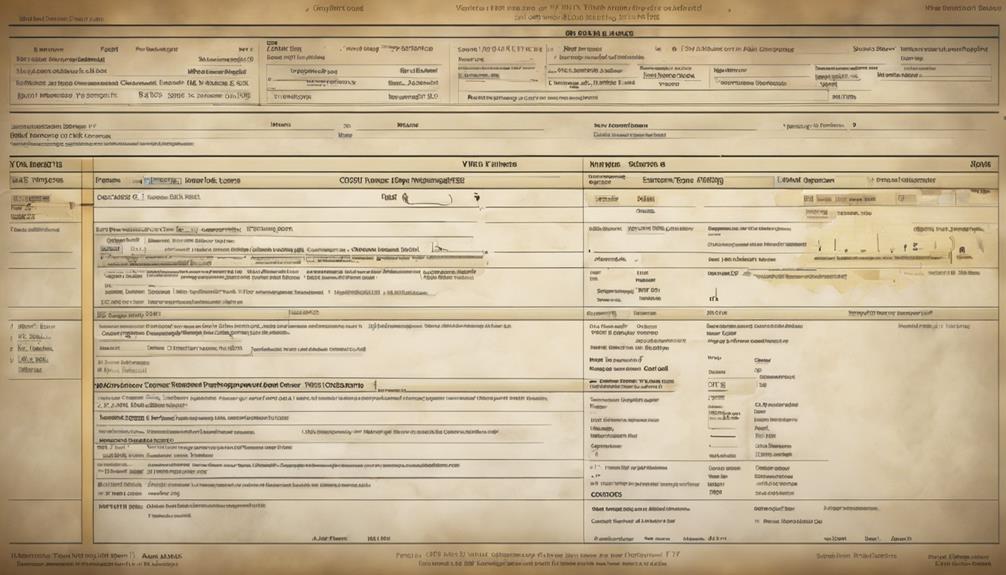Understanding the VA case citation regarding sleep apnea as a secondary condition to tinnitus and hearing loss can feel like deciphering a complicated puzzle.
The interplay between these conditions raises intriguing questions about how one can impact the other, leading us to explore the depths of medical evidence required for a successful claim.
As we navigate through this web of connections, it becomes imperative to unravel the nuances of establishing a solid link between tinnitus and sleep apnea, shedding light on the path that veterans must traverse to secure the benefits they rightly deserve.
Key Takeaways
- Establish strong nexus with medical evidence linking tinnitus and hearing loss to secondary sleep apnea.
- Use past VA case citations to support claims for secondary service connection benefits.
- Consider how hearing loss can impact breathing regulation during sleep, potentially leading to sleep apnea.
- Seek legal assistance for expert guidance in obtaining favorable disability ratings for secondary sleep apnea claims.

CPAP Mask, Universal CPAP Nasal Sleep Mask Reusable CPAP Supplies, Upgrade Silicone Soft Perfect Sealing CPAP Face Nose Masks with Headgear, Elbow/Swivel, Cushion
【Perfect Sealing】CPAP Masks fits the nostrils nicely, creating a secure sealing without pressure or pinching, leave no marks…
As an affiliate, we earn on qualifying purchases.
As an affiliate, we earn on qualifying purchases.
VA Case Citation Overview
Analyzing VA case citations enhances our understanding of how the VA has adjudicated claims for secondary conditions, such as sleep apnea secondary to tinnitus and hearing loss. VA case citations serve as valuable legal references, offering insights into the evidence and precedents necessary to establish a service connection for these conditions.
By reviewing relevant VA case citations, veterans can better prepare and strengthen their claims for benefits related to secondary conditions like sleep apnea. These citations provide a roadmap based on past decisions, guiding veterans on the successful strategies and evidence needed to support their claims effectively.
Understanding the nuances of VA case citations can significantly increase the likelihood of a successful claim outcome, especially when dealing with complex secondary conditions such as sleep apnea secondary to tinnitus and hearing loss. Therefore, utilizing these legal references can be instrumental in navigating the claims process and ensuring veterans receive the benefits they rightfully deserve.

Audien Atom One OTC Hearing Aids – Wireless, Rechargeable, and Comfortable | Clear Sound in a Small, Discreet Design for Seniors & Adults with Hearing Loss
Hear What Matters Most: Hearing isn’t one-size-fits-all. That’s why our adjustable frequency system lets you personalize your sound…
As an affiliate, we earn on qualifying purchases.
As an affiliate, we earn on qualifying purchases.
Sleep Apnea and Tinnitus Connection

Reviewing VA case citations provides valuable insights into the connection between sleep apnea and tinnitus, shedding light on how these conditions may be interrelated in veterans' claims for disability benefits.
Chronic tinnitus, a common condition among military personnel, is often linked to the severity of sleep disturbances such as sleep apnea. Studies show that around 80% of military personnel with tinnitus also suffer from noise-induced permanent hearing loss and sleep apnea. Interestingly, sleep apnea can exacerbate tinnitus, especially in individuals already vulnerable to hearing damage.
Veterans seeking VA disability benefits can potentially establish a service-connected relationship between their tinnitus and sleep apnea, where one condition may act as a secondary condition to the other. Despite these connections, the exact causal relationship between tinnitus and sleep apnea remains not completely understood, warranting further research to better assist veterans in addressing their chronic tinnitus and sleep apnea symptoms effectively.

REMSTAR Plus Portable Auto-C-Pap Machine with Humidifier for Effective Sleep Apnea Therapy at Home and Travel
The Remstar Plus CPAP System is a Continuous Positive Airway Pressure (CPAP) device designed for the at-home treatment…
As an affiliate, we earn on qualifying purchases.
As an affiliate, we earn on qualifying purchases.
Hearing Loss Impact on Sleep Apnea
Experiencing hearing loss can significantly impact the severity and management of sleep apnea in individuals. When considering how hearing loss affects sleep apnea, several key points arise:
- Breathing Regulation: Hearing loss can disrupt the body's ability to regulate breathing during sleep, potentially exacerbating the symptoms of sleep apnea.
- Auditory System: Disruptions in the auditory system due to hearing loss may contribute to an increased risk of developing sleep apnea.
- Respiratory System: The relationship between hearing loss and sleep apnea can affect the respiratory system's function, leading to more severe sleep disturbances.
- Quality of Sleep: Individuals with hearing loss may experience poorer quality of sleep due to the impact of this condition on sleep apnea symptoms like snoring and breathing interruptions.
Understanding how hearing loss impacts sleep apnea is essential for effectively managing both conditions and seeking appropriate medical interventions to improve overall well-being.

SecuLife New 2026 Fall Alert Device, Medical Alert Pendant with for Seniors, SOS Call, GPS Tracking & Reminders – Wearable Emergency Necklace for Elderly, Waterproof, 2-Way Calling, Panic Button
❤️ 𝐌𝐞𝐝𝐢𝐜𝐚𝐥 𝐀𝐥𝐞𝐫𝐭 𝐏𝐞𝐧𝐝𝐚𝐧𝐭 𝐰𝐢𝐭𝐡 𝐅𝐚𝐥𝐥 𝐃𝐞𝐭𝐞𝐜𝐭𝐢𝐨𝐧: Designed for seniors and individuals with medical conditions, this wearable alert…
As an affiliate, we earn on qualifying purchases.
As an affiliate, we earn on qualifying purchases.
Establishing Secondary Conditions Link

To establish a secondary link between Sleep Apnea and Tinnitus and Hearing Loss, we must present compelling medical evidence connecting these conditions. Veterans seeking VA disability benefits should ensure there is a clear nexus between their service-connected tinnitus and hearing loss and the development of sleep apnea. This connection can be supported by expert medical opinions, diagnostic tests, and treatment records that illustrate how the primary conditions have led to or worsened the secondary condition of sleep apnea. By providing a well-documented claim with strong medical evidence, veterans can strengthen their case for establishing a secondary service connection. This approach increases the likelihood of successfully linking sleep apnea as a secondary condition to tinnitus and hearing loss, thereby improving the chances of receiving the necessary VA disability benefits.
| Key Points | Emotion Evoked | Importance |
|---|---|---|
| Medical Evidence | Trust | Vital |
| Nexus Connection | Reassurance | Crucial |
| Diagnostic Tests | Validation | Essential |
| Treatment Records | Support | Indispensable |
VA Disability Ratings Considerations
Considering the severity of the condition and its impact on overall health, VA disability ratings for sleep apnea as secondary to tinnitus and hearing loss are determined based on medical evidence, including nexus letters and treatment records.
When evaluating VA disability ratings for sleep apnea as secondary to tinnitus and hearing loss, the following key considerations come into play:
- Severity of Sleep Apnea: The severity of the sleep apnea, as documented in medical records, plays a crucial role in determining the disability rating.
- Established Nexus: A clear nexus must be established between the service-connected tinnitus or hearing loss and the development of secondary sleep apnea to qualify for benefits.
- Impact on Daily Life: The impact of sleep apnea on the individual's daily life and overall health is considered in the rating process.
- Legal Assistance: Seeking guidance from experienced Veterans law attorneys can aid in presenting a strong case and improving the chances of obtaining a favorable disability rating for sleep apnea as secondary to tinnitus and hearing loss.
Frequently Asked Questions
Is Sleep Apnea Secondary to Tinnitus VA Disability?
Yes, sleep apnea can be considered secondary to tinnitus for VA disability benefits if there's a clear medical nexus linking the two conditions. Veterans need to provide evidence demonstrating how their service-connected tinnitus has impacted the development or worsening of sleep apnea.
Establishing a direct connection between tinnitus and sleep apnea is crucial for a successful claim for secondary service connection. Medical documentation and expert opinions are vital for proving eligibility for VA benefits.
What Is the Nexus Between Sleep Apnea and Tinnitus?
The nexus between sleep apnea and tinnitus is a complex interplay. While not directly causing each other, they can influence symptoms. Sleep disturbances from tinnitus may worsen sleep apnea, and changes in breathing patterns from sleep apnea could exacerbate tinnitus.
Understanding this relationship is crucial for managing both conditions effectively and promoting overall health.
How can we address these intertwined issues to improve well-being and quality of life for individuals dealing with sleep apnea and tinnitus?
Can Hearing Loss and Tinnitus Cause Sleep Apnea?
Yes, hearing loss and tinnitus can contribute to sleep disturbances that worsen sleep apnea symptoms. While not direct causes, these conditions can lead to fatigue and impact sleep quality.
Managing hearing-related issues alongside sleep apnea is crucial for overall well-being.
The complex relationship between hearing loss, tinnitus, and sleep apnea necessitates further research for a clearer understanding of their interplay and implications for individuals' health.
What Are the Secondary Conditions to Tinnitus?
When exploring secondary conditions linked to tinnitus, it's crucial to acknowledge the various challenges veterans may face. An interesting statistic reveals that up to 80% of individuals with tinnitus also experience some form of hearing loss.
This overlap can lead to additional issues like sleep apnea, migraines, and cognitive impairment. Understanding these secondary effects is vital in providing comprehensive care and support to veterans seeking service connection for tinnitus and its related conditions.
Conclusion
While proving secondary conditions like sleep apnea as linked to service-connected tinnitus and hearing loss can be complex, seeking the help of experienced Veterans law attorneys can greatly increase the chances of a successful benefits application.
Remember, your health and well-being are worth fighting for, and the support you deserve is available to you.
Don't let obstacles deter you from seeking the compensation and care you rightfully deserve.










